#Partisanship
Explore tagged Tumblr posts
Photo

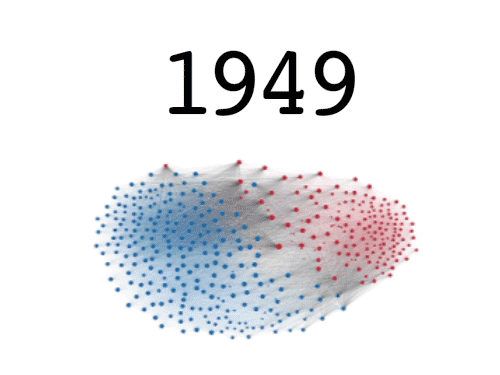

Another departure from pure science, but some interesting data visualization from a study published last week. Each dot is a single member of the House of Representatives (democrats = blue, republicans = red). The proximity and lines between dots indicates cooperation - voting the same way on legislation. The more they vote the same way, the thicker the connecting lines and the closer the dots.
12K notes
·
View notes
Quote
I hate the indifferent. I believe that living means taking sides. Those who really live cannot help being a citizen and a partisan. Indifference and apathy are parasitism, perversion, not life. That is why I hate the indifferent. The indifference is the deadweight of history. The indifference operates with great power on history. The indifference operates passively, but it operates. It is fate, that which cannot be counted on. It twists programs and ruins the best-conceived plans. It is the raw material that ruins intelligence. That what happens, the evil that weighs upon all, happens because the human mass abdicates to their will; allows laws to be promulgated that only the revolt could nullify, and leaves men that only a mutiny will be able to overthrow to achieve the power. The mass ignores because it is careless and then it seems like it is the product of fate that runs over everything and everyone: the one who consents as well as the one who dissents; the one who knew as well as the one who didn’t know; the active as well as the indifferent. Some whimper piously, others curse obscenely, but nobody, or very few ask themselves: If I had tried to impose my will, would this have happened? I also hate the indifferent because of that: because their whimpering of eternally innocent ones annoys me. I make each one liable: how they have tackled with the task that life has given and gives them every day, what have they done, and especially, what they have not done. And I feel I have the right to be inexorable and not squander my compassion, of not sharing my tears with them. I am a partisan, I am alive, I feel the pulse of the activity of the future city that those on my side are building is alive in their conscience. And in it, the social chain does not rest on a few; nothing of what happens in it is a matter of luck, nor the product of fate, but the intelligent work of the citizens. Nobody in it is looking from the window of the sacrifice and the drain of a few. Alive, I am a partisan. That is why I hate the ones that don’t take sides, I hate the indifferent
Antonio Gramsci
416 notes
·
View notes
Photo
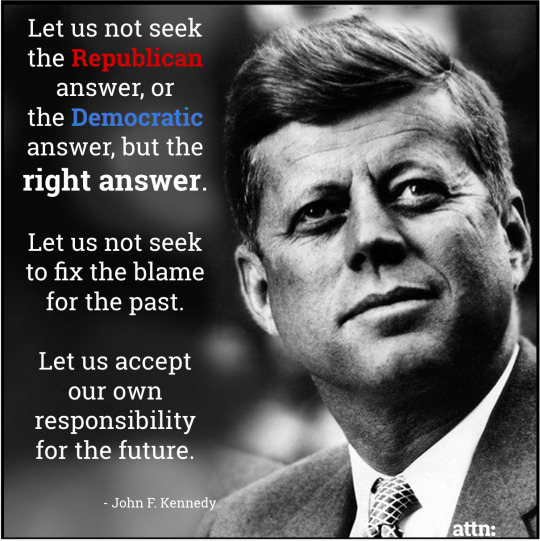
Wise words.
326 notes
·
View notes
Link
These same Republicans also give Trump an 87% approval rating (compared with 37% from independents, 8% from Democrats, and 43% overall), and only an 11% disapproval rating (compared with 61% from independents, 92% from Democrats, and 54% overall).
For 52% of people overall, the most common thing they do to verify that what they hear or read is true is “Google search to verify facts.” 55% of independents do this, and 57% of Democrats. Most Republicans, though, have a different technique: 51% of them “Stick to news sources I trust.”
The full poll is here. A similar poll from the Pew Research Center is here, and one from Gallup is here. Among Gallup’s findings: “Four in 10 Republicans consider accurate news stories that cast a politician or political group in a negative light to always be ‘fake news.’”
#fake news#Republicans#GOP#partisanship#Democrats#free press#media#mainstream media#poll#Pew#Pew Research Center#Gallup
257 notes
·
View notes
Photo
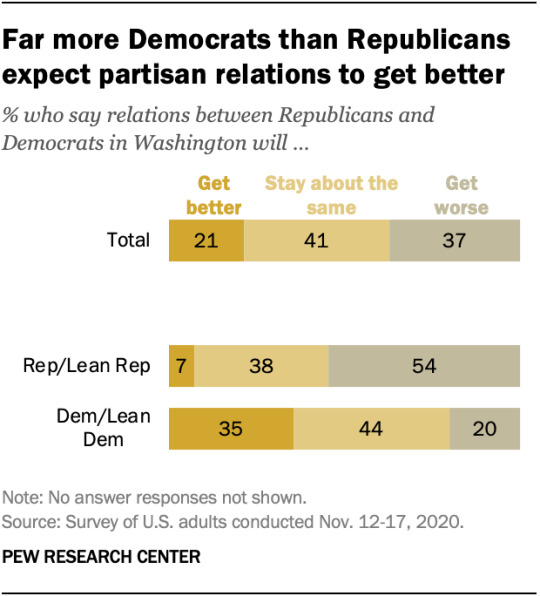
With the delayed transition to a Biden administration now underway, Americans have only modest expectations that the partisanship that has dominated Washington in recent years will ease in 2021. However, Democrats are much more optimistic than Republicans that relations between the two parties will improve.
Just 21% of Americans say relations between Republicans and Democrats will get better in the coming year. Far more (37%) expect relations to worsen, while 41% say they will stay about the same.
Following Joe Biden’s victory and his post-election call for partisan unity, significantly more Democrats and Democratic-leaning independents (35%) than Republicans and Republican leaners (7%) say relations between the two parties in Washington will improve.
Read more in our blog post: Democrats more optimistic than Republicans that partisan relations in Washington will improve in 2021
192 notes
·
View notes
Photo

Six decades of increasing partisanship in the U.S. House of Representatives.
By Lisa Wade, PhD
It sure seems like U.S. Democrats and Republicans are less likely to cooperate than they have been in the past and now, thanks to geographer Clio Andris and her colleagues, we can see that it’s true. They plotted six decades of voting in the House of Representatives, noting the likelihood that their vote will cross party lines.
This is your image of the week:
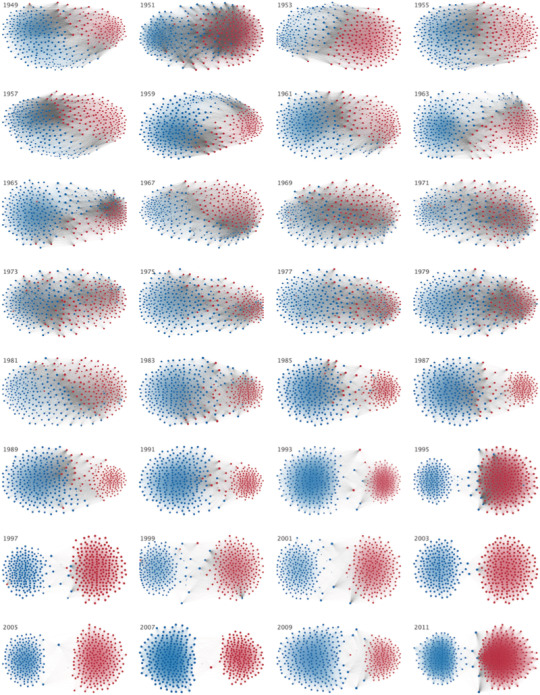
Lisa Wade is a professor of sociology at Occidental College and the co-author of Gender: Ideas, Interactions, Institutions. You can follow her on Twitter and Facebook.
192 notes
·
View notes
Note
We actually talked about stuff like that in my bio class--how one side of the political spectrum treats the other like they're the devil and it's what's caused the political climate to become so bad. It caused people to travel further and further to their side until you can't even see the other side as a human. It's why we can't have open, honest discussions with each other and it sucks and it's people like that's fault.
^^
141 notes
·
View notes
Photo


87 notes
·
View notes
Link
Extremism of any kind is unacceptable, but [Defense Secretary Lloyd] Austin’s obsession with radicalism in the ranks has not been proportionate or even-handed. Out of two million military members, the [Countering Extremist Activity Working Group] report admits that incidents are “rare . . . fewer than 100 over the past year.”
[Fox News reporter] Griffin asked [spokesman] Kirby for a breakdown: “What portion if any, [were] members of the sort of groups that you might consider white supremacist groups or were there also some who may have been present at a Black Lives Matter protest?”
Kirby said he had no specifics, a peculiar response since the Defense Department tracks everything from bullets to battleships. Four research contractors are working on DOD anti-extremist projects, but training materials concentrate on extremists on the far right of the political spectrum, not the far left.
This makes no sense because, as Mollie Hemingway noted in her book, “Rigged,” the Armed Conflict Location and Event Data Project (ACLED) tracks incidents of violence instigated by extremist groups of both the right and the left. Kevin Roberts of the Washington Examiner cited ACLED in reporting, “of 1,101 violent incidents across 97 days, 933 of them directly involved Black Lives Matter. That’s 84.7% of the civic violence in America across summer 2020.”
You would never suspect such a disproportionate ratio looking at last year’s “standdown” discussion guides, which included four examples of “problematic behaviors” – all of them referencing neo-Nazi and white supremacy groups.
#Lloyd Austin#partisanship#polarization#extremism#First Amendment#military#Rigged#Mollie Hemingway#Armed Conflict Location and Event Data Project#political violence#BlackLivesMatter#emphasis added to original#Elaine Donnelly
69 notes
·
View notes
Photo
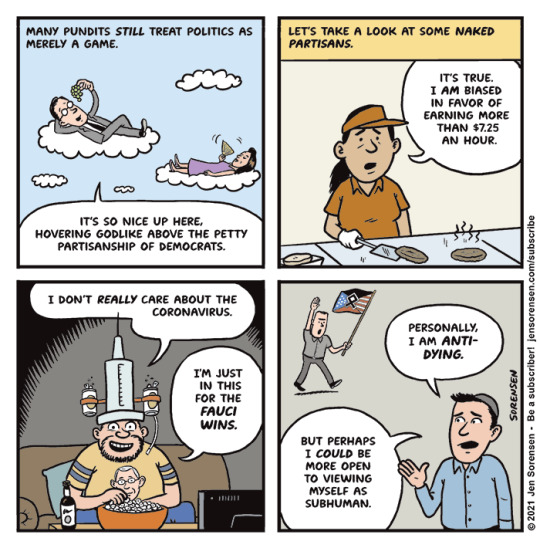
For many people, politics is more than just a “partisan game.”
If you are able, please consider joining the Sorensen Subscription Service! Now available on Patreon
64 notes
·
View notes
Photo
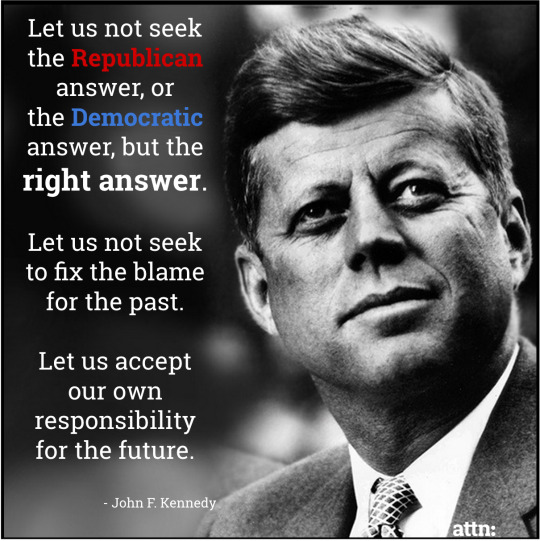
Now that Congress is back in session...
148 notes
·
View notes
Photo
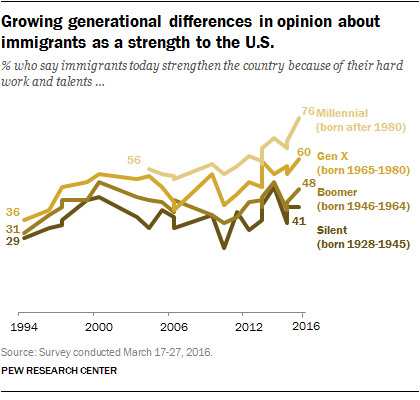
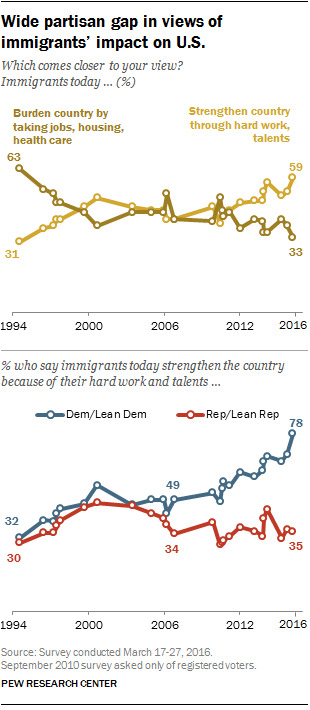
For more than 20 years, Pew Research Center has been asking whether immigrants in the U.S. “strengthen our country because of their hard work and talents,” or whether they “are a burden on our country because they take our jobs, housing and health care.”
In that time period, opinions about immigrants have shifted dramatically and there are substantial – and growing – partisan and generational divides over whether immigrants generally are a strength or burden on the country.
Americans’ views of immigrants marked by widening partisan, generational divides
122 notes
·
View notes
Photo
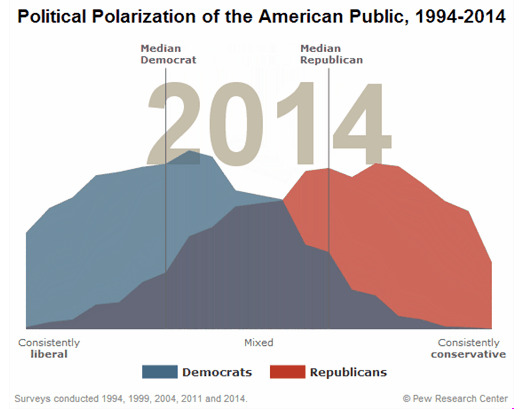
After a slight shift to the left in the early 2000s, Republicans lurched back to the right, and politics has become ever more polarized ever since.
By Tristan Bridges, PhD
Democrats and Republicans are deeply divided. By definition, political parties have differences of opinion. But these divisions have widened. Twenty years ago, your opinions on political issues did not line up the way we have come to expect them. Today, when you find you share an opinion with someone about systemic racism, you’re more likely to have like minds about environmental policies, welfare reform, and how they feel about the poor, gay and lesbian people, immigrants and immigration, and much more. In other words, Democrats and Republicans have become more ideologically consistent in recent history.
A recent Pew Report reported that in 1994, 64% of Republicans were more conservative than the median Democrat on a political values scale. By 2014, 92% of Republicans were more conservative than the median Democrat. Democrats have become more consistently liberal in their political values and Republicans have become more consistently conservative. And this has led to increasing political polarization (see HERE and HERE for smart posts on this process by Lisa Wade and Gwen Sharpe). You can see political polarization happening here.
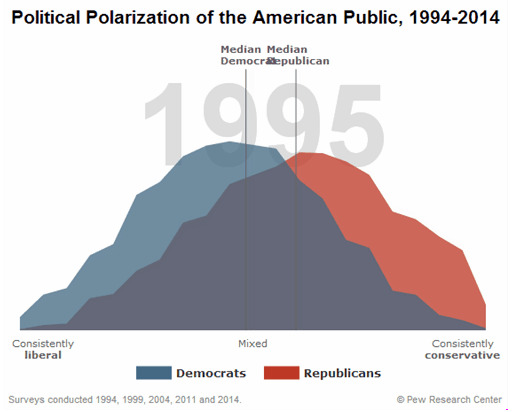
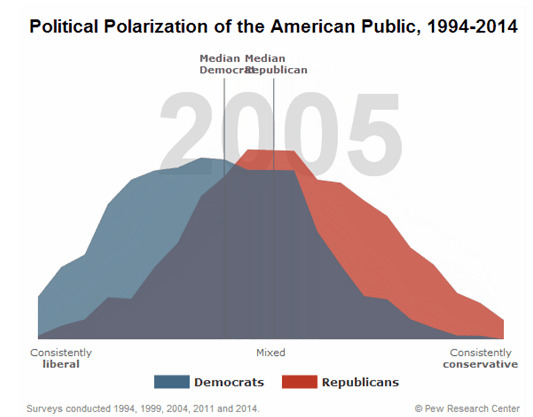
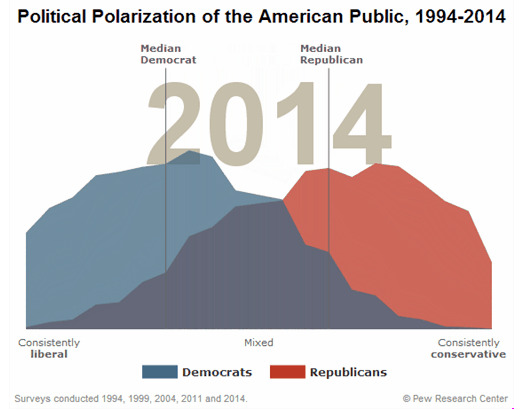
You might think ideological commitments naturally come in groupings. But there are lots of illogical pairings without natural connections. Why, for instance, should how you feel about school vouchers be related to how you feel about global warming, whether police officers use excessive force against Black Americans, or whether displays of military strength are the best method of ensuring peace? The four issues are completely separate. But, if your Facebook feed looks anything like mine, knowing someone’s opinion about any one of these issues gives you enough information to feel reasonably confident predicting their opinions about the other three. That’s what ideological consistency looks like.
Consider how this process affects understandings of important systems of social inequality that structure American society. Discrimination is an issue that sociologists have studied in great detail. We know that discrimination exists and plays a fundamental role in the reproduction of all manner of social inequalities. But, people have opinions about various forms of discrimination as well—even if they’re unsupported by research or data. And while you might guess that many Americans’ opinions about one form of discrimination will be predictive of their opinions about other forms, there’s not necessarily a logical reason for that to be true. But it is.
The following chart visualizes the proportions of Americans who say there is “a lot of discrimination” against Black people, gay and lesbian people, immigrants, transgender people, as well as the proportions of Americans who oppose laws requiring transgender people to use bathrooms that correspond to their sex at birth. And you can see how Americans identifying as Democrat and Republican compare.
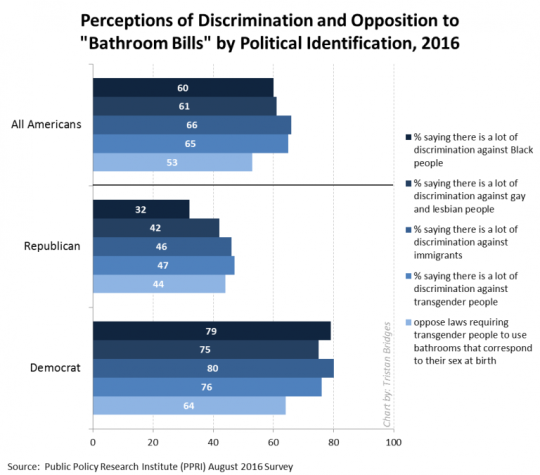
The majority of Americans understand that social inequalities exist and that discrimination against socially marginalized groups is still a serious problem. By that, I mean that more than half of Americans believe these things to be true. And data support their beliefs. But look at the differences between Democrats’ and Republicans’ opinions about important forms of discrimination in U.S. society. The gap is huge. While just less than 1 in 3 Republicans feels that there is a lot of discrimination against Black people in the U.S., almost 8 in 10 Democrats support that statement. That’s what political polarization looks like. And Pew found that the trend is even more exaggerated among voters.
Republicans and Democrats are not just divided about whether and what to do about forms of social inequality. They’re divided about whether these inequalities exist. And that is an enormous problem.
Tristan Bridges, PhD is a professor at The College at Brockport, SUNY. He is the co-editor of Exploring Masculinities: Identity, Inequality, Inequality, and Change with C.J. Pascoe and studies gender and sexual identity and inequality. You can follow him on Twitter here. Tristan also blogs regularly at Inequality by (Interior) Design.
163 notes
·
View notes
Quote
For everyone on the left who criticizes me for not being left... or ‘woke’... enough, there is someone on the right who criticizes me for not readily embracing the right... despite the issues that I have with the left. The fact of the business is, I have no use for binary thinking. It’s also important for me to mention that, for the various issues that I have with the ‘wokescold’ portion of the left, I have far more issues with the ‘alt-right’ portion of the right. You really must understand... I'm about principles, not partisanship.
Jimmy Reed, On Principles or Partisanship
45 notes
·
View notes
Link
Pro-Israel Democrats could have taken a stand against her and Tlaib. But, intimidated by the rise of the intersectional movement that has seized control of the left-wing base of the Democratic Party, and fearing that they will be branded as racists if they speak out, they have refused to ostracize them.
In doing so, they have essentially legitimized Omar’s views. Her anti-Zionist and antisemitic ideas are now routinely published in the pages of liberal mainstream outlets like The New York Times and The Washington Post. And the ranks of the “Squad” have vastly expanded in the last two election cycles, with even more sympathizers among those who identify as progressive Democrats.
Republicans have their outliers, like Greene and others. They routinely make outrageous and often indefensible statements, although Democrats are equally guilty of the promiscuous use of inappropriate Holocaust analogies.
But they are not guilty of seeking to normalize antisemitism by masquerading as mere “critics” of Israel. And, unlike Omar, they lack the influence that comes with being part of a movement that already dominates academia and much of the media with its toxic myths about white privilege and lies about Israel’s being an “apartheid” state.
-
In giving Omar a pass for antisemitism, Democrats have crossed a line that no party or its supporters can transgress without being rightly accused of enabling Jew-hatred. By rallying around her, either out of party loyalty or hypocritical opposition to cancel culture that they never apply to embattled conservatives, is to make antisemitism a partisan issue. This is a historic development that may make it impossible to ever put the genie of intersectional hate for Jews back in the bottle. It’s also an unforgivable betrayal of their Jewish voters and the principles of tolerance that they claim to uphold.
36 notes
·
View notes

